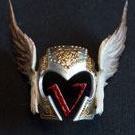The Theory of Argument/Conflict(s) Evolution
-
1. This would classify under _____
-
Argument0
-
Conflict0
-
-
2. Is this de-evolution of argument caused by the de-evolution of the human species, or lower standards of literacy in today's society?
-
It's caused by the de-evolution of the human species.0
-
It's caused by the lower literacy standards in today's society.0
-
-
Similar Content
-
- 3 comments
- 182 views
-
- 0 comments
- 269 views
-
- 2 comments
- 287 views
-
- 9 comments
- 698 views
-





Recommended Posts
Create an account or sign in to comment
You need to be a member in order to leave a comment
Create an account
Sign up for a new account in our community. It's easy!
Register a new accountSign in
Already have an account? Sign in here.
Sign In Now